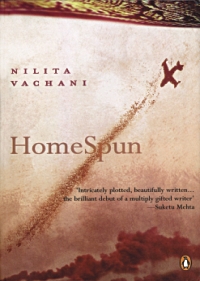Book Review
A Tale of Love and War
Zahid Akter
Every reading is a political construct. In modern times, human behavior takes place in the more tangible dynamics of national politics and history. But the perennial debate over what constitute art keep many novelists away from alluding to power politics in their works. It is as if depiction of national movements and struggles weakens the uniqueness of individual characters, bringing them down on a par with one another. Such novels apparently result from a writer's preconceived design and are often categorized as propaganda novels. Nilita Vachani locates the plot of her debut novel Homespun in the Indian national movement depicting how distantly yet inevitably national politics has a bearing on our homesteads.The story of Homespun begins with a nanaji's death. It then unrolls in a series of flashbacks and ends when nanaji dies. But by now we have met a myriad of characters, all with their apprehensions and aspirations and we no more feel the same about the death. We are now told how the national movement of India changed the whole course of nanaji's life as well as the lives of those connected to him. A staunch follower of Gandhi's philosophy, nanaji took the path of rebellion, quit his job, lived in what can be called a slum, and spent years in prison. Such was his devotion to Gandhi's cause that when he lost a piece of cloth spun by the Mahatma at home (thus comes the title Homespun) he cried and cursed himself. Nanaji's wife, on the contrary, did not find anything appealing about Gandhi's ideology. As he could never get on well with his wife, we know how one's political persona makes up one's fabric and leads to far-reaching consequences. We then encounter Ronu Kalra, little knowing how he relates to the preceding tale. (This made me check the content to make sure I was not reading an anthology of short stories). Ronu starts as a child actor in Mumbai and turns into a hero overnight. This led his father to believe that one day his son must serve his nation like a national hero. Consequently, Ronu joined the Indian air force. Meanwhile, he falls in love, terminates the relationship and ended up in marrying a person of his father's choice. Ronu eventually died in the war with Pakistan. Which is of significance, Ronu left a daughter who could never come to terms with his death. So couldn't Ronu's former lover, Anu. Anu took upon her the responsibility of uncovering the mystery of Ronu's death. In the process, what she discovered can be termed both shocking and incredible. The quest, however, leads her to Ronu's daughter, Sweta. It was Sweta's nanaji that we met earlier. Now we know how the tale of Ronu connects to nanaji's episode. We are also left wondering how the improbable takes over our fate in the long run. Ronu Kalra became a pilot, which he should have never been. Nanaji chose a bride he should have never chosen. Homespun, need we say, should not be read for its storyline alone, though it excels in its style of telling. As you finish reading the book, countless small incidents will keep floating in your mind. You will also appreciate the novelty of its plot design. Atypically, it does not make one character its central focus. Lives of important characters take shape in their distinct worlds allowing us to get a better grasp of their perspectives. As they grow older, life's expediencies take them away, making them intersect with one another. However, we meet people belonging only to the middle class. Little do we learn about how India's birth helped transform the fortunes of the marginalized. The prose of Homespun is both lucid and unassuming. Once you start reading, you cannot help being carried away. In the same unpretentious tone, the writer keeps telling a fascinating tale of death, love, sex, war and broken dreams. Nilita Vachani is surely a worthy entry to the growing legion of South Asians writing in English, and as this first novel demonstrates, capable of leaving her mark on the literary scene. Zahid Akter teaches English at East-West University, Dhaka.
|

Homespun by Nilita Vachani; Penguin Books India; 2005; Rs 295;pp. 279 |